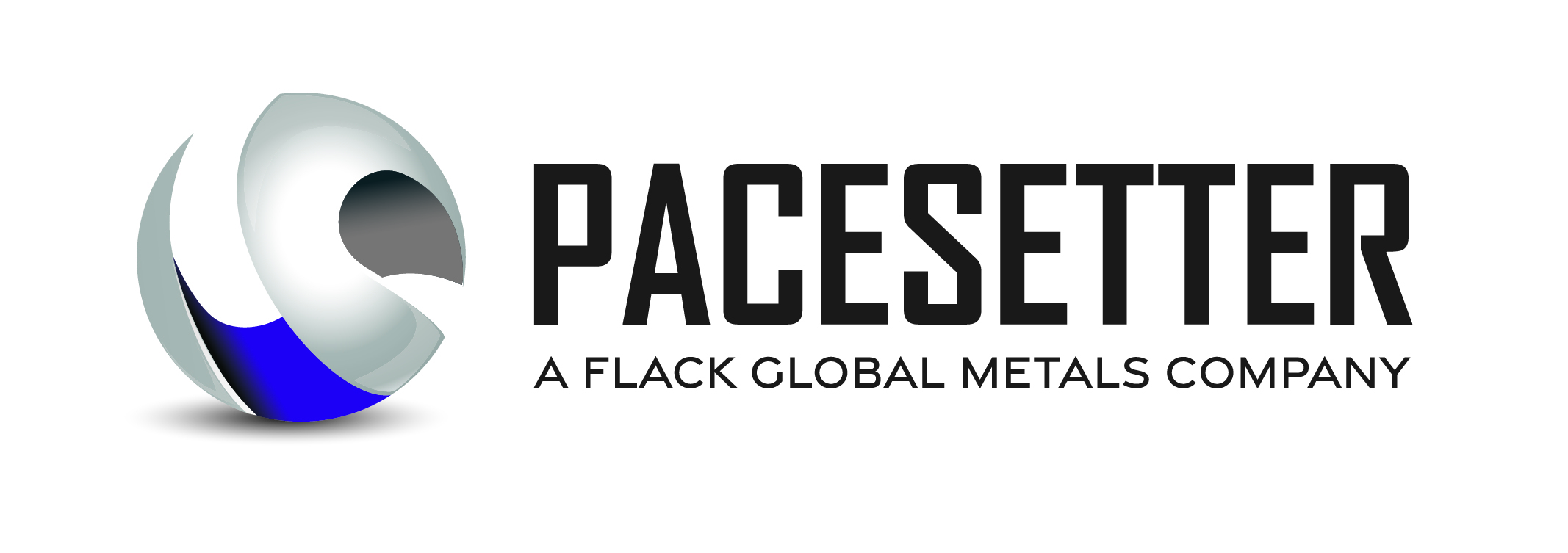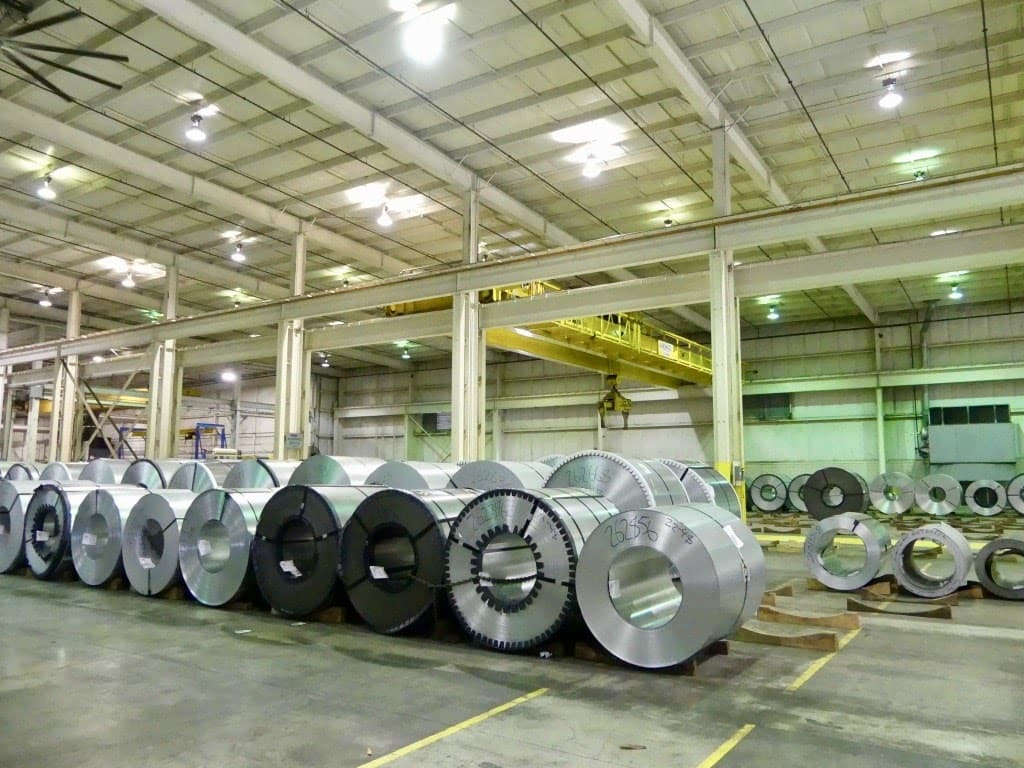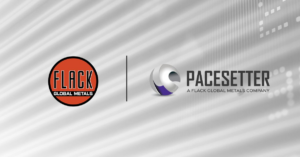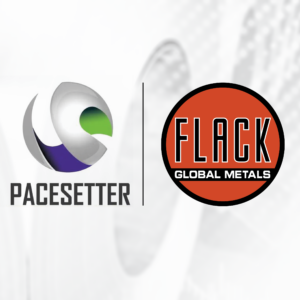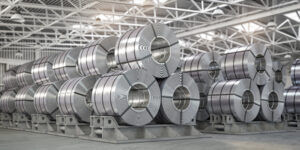What is Aluminized Steel? Everything You Need to Know
Steel is the go-to metal for strength and affordability, but “regular” carbon steel isn’t perfect for every job – it can oxidize and rust when exposed to the elements, making it unsuitable for many applications. That’s where aluminum comes in. Although it is not nearly as strong as steel, the aluminum coating is highly resistant to corrosion.
Put these two metals together, and you get the best properties of both—a strong metal that resists wear and tear from heat. Let’s discuss everything you need to know about aluminized steel and when you should use it for your next big project.
Not only does Aluminized offer superior corrosion protection, but it also withstands heat to a degree other steels don’t! At up to 800℉, Type 1 Aluminized reflects up to 80% of radiant heat that hits it, and it can withstand temperatures up to 1250℉.
What is Aluminized Steel?
Aluminized steel comes in two types, Type 1 and Type 2. Both are made in processes similar to making galvanized, on continuous coil coating lines at steel mills. Type 1 is steel coated with approximately 91% aluminum and 9% silicon. Type 2 is a pure aluminum coating.
Aluminized Steel Properties and Benefits
Aluminum may be a soft metal by itself, but it creates one tough product when melded with aluminized steel. In fact, aluminized steel can withstand temperatures up to 900 degrees Fahrenheit and keep its shiny appearance the entire time.
There are many benefits to aluminized steel, including:
- The strength of steel with the corrosion resistance of aluminum
- High-temperature resistance
- Low thermal expansion
- Formability that allows rolling, folding, bending, and even corrugating
- All common steel grade types are available in Aluminized: CS-B, DS, DDS, and EDDS. High strength options also.
Is Aluminum Stronger than Steel?
Steel is stronger than aluminum when you compare the two pieces of metal side by side.
Imagine trying to tear a piece of aluminum foil and then doing the same with a sheet of steel—it’s no contest. Steel packs in 250% more density and weight than aluminum, giving it a significant advantage in the strength department. However, stronger doesn’t always mean better. After all, aluminized steel takes the best of both metal properties to create a processed metal ideal for many applications.
Does Aluminized Steel Rust?
While steel by itself can easily rust, aluminized steel benefits from the natural protections of aluminum. When exposed to the atmosphere, aluminum creates a protective layer of aluminum oxide, which prevents the underlying metal from corrosion and rust. So, rest assured, your aluminized steel won’t rust under normal circumstances.
Is Aluminized Steel Safe?
Type 1 aluminized steel is what you’ll find in cooking sheets and bakeware. The reason is that the aluminum-silicon coating doesn’t rust or affect the flavor of food. As long as the layer isn’t compromised by scratching, it is deemed completely safe. However, deep scratches will expose the underlying steel, possibly leading to corrosion and rust that can get onto food.
Is Aluminized Steel Safe to Cook With?
Yes, when kept scratch-free. To keep aluminized bakeware safe, don’t use metal utensils on it, and hand wash it with a sponge or nylon brush.
Is Aluminized Bakeware Toxic?
Aluminized bakeware oxidizes, creating a layer of protection between aluminum and your food and preventing any leaching of metals. But your cookie sheets, muffin pans, and cake pans need to be treated carefully. Prevent scratches by using silicone or plastic utensils—not metal—when removing food. And never wash them in the dishwasher or with a metal scrub pad or brush.
What is Aluminized Steel Exhaust?
When selecting exhaust pipes, aluminized steel has many benefits. Although more expensive than mild steel, it’s cheaper than stainless steel and easier to work with. The aluminized coating will protect the pipes from rusting, but scratches and damage can remove the protective layer.
Rock dings, scraping curbs, and even welding joints can create vulnerable spots that will eventually rust.
How Long Does Aluminized Steel Exhaust Last?
Aluminum steel exhaust pipes can last for years, but the climate can impact precisely how long. In a dry environment, an aluminized exhaust system can last for over eight years. However, a car driven daily may need new pipes in a moderate climate after three to five years.
Aluminized Steel vs Stainless Steel
So, why choose aluminized steel over stainless steel? For starters, price. Aluminum is a less expensive metal than steel, with the added benefit of being resistant to corrosion.
Aluminum also weighs less and is less dense than solid steel. So, when a thin sheet of steel is coated in aluminum or aluminum alloy, you’re significantly reducing the amount of pure carbon steel, drastically dropping the finished product’s price, weight, and density.
What is Aluminized Steel Used For?
Aluminized steel is found in several industries, but mostly where you’ll find heat. That’s because this alloy has high heat resistance in addition to a natural aversion to corrosion.
Some common products that are made from aluminized steel include:
- Heat exchangers in residential furnaces
- Commercial rooftop HVAC units
- Automotive mufflers
- Ovens and kitchen ranges
- Water heaters
- Fireplaces
- Barbecue burners
- Baking pans, including cooking sheets, muffin pans, and roasting pans
Types of Aluminized Steel
Aluminized” steel is hot dip-coated (like galvanized) on both sides, but the coating content is quite different. Unlike hot dip galvanized (HDG), which has a coating of 99+% zinc, an aluminized coating is 90+% aluminum. The exact aluminum % depends on the type, of which there are two:
Type 1
Type 1 aluminized steel is hot-dip coated in an aluminum-silicon alloy, giving the resulting sheet of metal high resistance to heat. Type 1 steel resists corrosion and warping even when exposed to extreme temperatures. Baking pans, water heaters, ovens and ranges, furnaces, and vehicle mufflers are commonly made with Type 1 aluminized steel.
Type 1, in addition to aluminum, contains between 5% to 11% silicon. This grade is used where heat resistance is required. Typical applications are dryer ducts, baking pans, ovens, ranges, grills, furnaces, heaters, fireplaces, and mufflers.
Type 2
Type 2 aluminized steel is hot-dip coated in pure aluminum. The process gives the metal superior protection for industrial applications like corrugated roofing and siding, grain bins, air-conditioner condenser housings, and even drying ovens.
Type 2 uses pure aluminum as its coating, and the coating is often thicker than that used in Type 1. End-uses include industrial cladding and jacketing over insulation, pipes that carry corrosive materials with steam or acids, storage tanks, grain bins, rooftop HVAC, corrugated roofing and siding, grain bins, drying ovens, and air-conditioner condenser housings. For any finished product that needs a thick, protective coating, Type 2 is the best option.
It has the strength and durability of steel (same steel substrate as galvanized) and the surface qualities of aluminum (corrosion resistance foremost among them). It is more economical than metals like stainless steel. Aluminized is also less likely to deform under heat than stainless. Aluminized standards are in ASTM A463.
As discussed previously, in the late 1800s, scientists discovered how to separate aluminum from other minerals and produce it on an industrial scale. Lighter than steel, it came to be used in everything from bats to pop cans, and eventually, the aluminization process was perfected.
Aluminized Steel Manufacturing, Processing, and Finishing Services. Request a Quote, Today!
Pacesetter provides comprehensive steel services and steel products for businesses across the country. Get in touch with our team and request a quote to receive the best quality and priced steel for your next project. We will handle any custom request for the job to ensure it meets your project requirements. You can also call us directly at (770) 919-8000 or send us an email at myadvantage@teampacesetter.com. Hope to chat with you soon!
